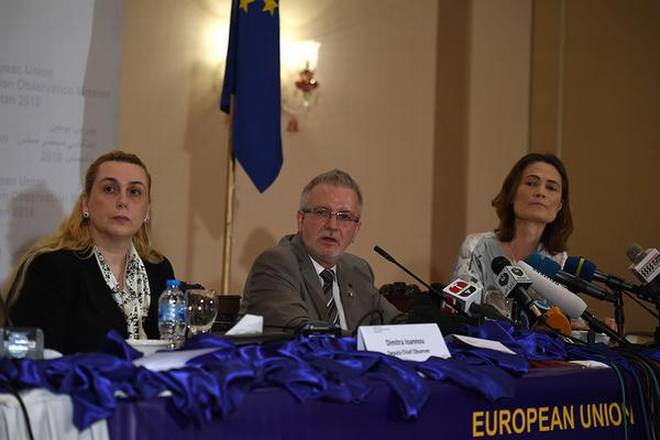
Imran Khan to form government with the support of allies, Independents; Opposition parties question results.
A European Union election observer mission to Pakistan has said that the July 25 election was “negatively affected” by the political environment in the country and suffered from an “unequal opportunity to campaign”.
The mission’s comments on Friday in Islamabad came as Imran Khan’s Pakistan Tehreek-e-Insaf (PTI) won 117 seats, Nawaz Sharif’s Pakistan Muslim League-Nawaz (PML-N) took 64 and the Bhutto-Zardari’s Pakistan People’s Party (PPP) tally stood at 43, Pakistan’s Election Commission said.
The Opposition — ranging from the PPP and the PML(N) to the religious parties grouped under the Muttahida Majlis-e-Amal (MMA) — have questioned the results as having been rigged and manipulated.
Nearly 48 hours after polling, an election commission official said the turnout for the National Assembly stood at 51.85%, three percentage points lower than in 2013.
The election was overshadowed by restrictions on freedom of expression and while voting was transparent, counting was “somewhat problematic” with staff not always following procedures, the 120-strong EU observer mission said.
In an editorial, the Karachi-based Dawn newspaper wrote: “The shocking mismanagement of the process of counting votes and announcing results at the polling station has made it necessary that the entire ECP [Election Commission of Pakistan] senior leadership resign after the election formalities are completed and a high-level inquiry be conducted at the earliest.”
Mr. Khan is, however, set to be sworn in as Prime Minister with the support of allies and Independents.
Independents are reported to have won 12 seats while the Muttahida Qaumi Movement-Pakistan (MQM-P), a potential PTI ally, has five. The new National Assembly is expected to meet by August 15.
Interestingly, Mr. Khan won all five of the seats he contested while Bilawal-Bhutto Zardari, Maulana Fazlur Rehman (Jamiat Ulema-e Islam-F), Asfandyar Wali (Awami National Party) lost in their traditional strongholds. Mr. Bilawal Bhutto, however, won in the traditional family constituency of Larkana while PML-N leader Shahbaz Sharif managed to win only one of the four seats he contested.
Pakistan also elected it’s first-ever Hindu from a general seat on the PPP ticket since non-Muslims were allowed to contest and vote in general seats in 2002. Mahesh Kumar Malani won the Tharparkar-II seat in Sindh province.
Roshan Pakistan Polling Agency estimated that a new, hardline religious party, the Tehreek-e-Labbaik, managed an 8-10% share of the vote in Punjab, causing the PML-N a staggering 14 National Assembly seats.
In the key province of Punjab, both the PML-N with 127 seats and PTI with 123 seats had said they would stake claim to form the government in a 297-member House. The PPP however, managed only six seats.



